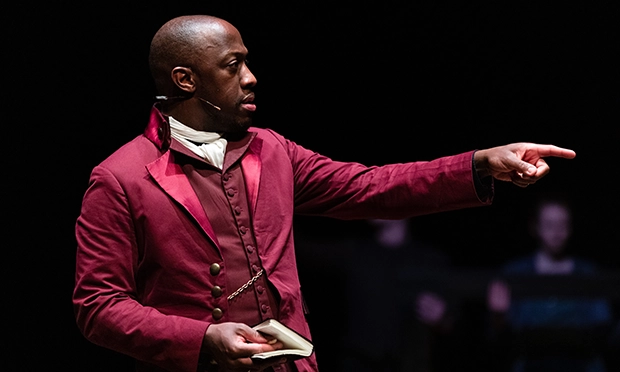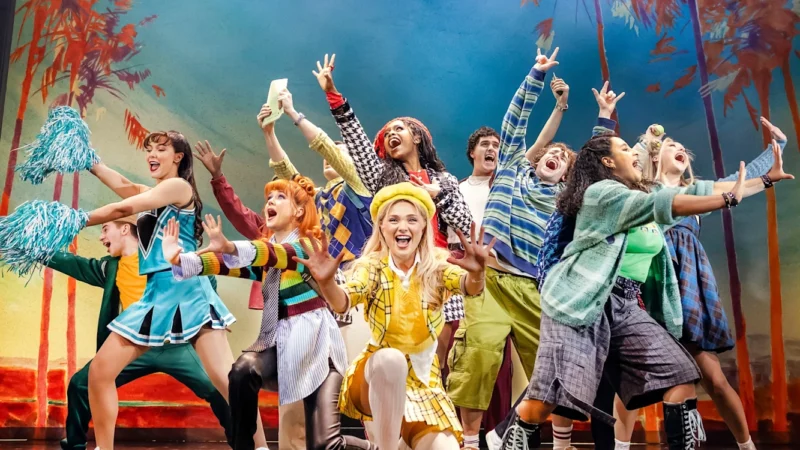‘A mammoth achievement’
Amidst the city, the fortified seat of British commerce, Giles Terera’s debut play about the slave ship Zong finds a strikingly fitting home.
However, as the show unfolds, we realise that it would have resonance in any ancient theatre or Town Hall in the country.
“Anyone who lifts a spoon of sugar to their tea,” proclaims one of the characters to describe the pervasiveness of the transatlantic slave trade.
But I’m getting ahead of myself – an easy thing to do with such an important subject matter.
Olivier Award-winning actor Terera has been working on this play for six years. It was commissioned by the Bristol Old Vic and National Theatre following a stage reading in 2018 and a radio adaptation that was released during the pandemic.
Now it has followed its run in Bristol to bring its message to the historic brain of the Euro-American slave trade, London.
The story follows writer and trailblazer of the abolitionist movement, Olaudah Equiano, played by Terera himself.
Equiano informs fellow abolitionist Granville Sharp (played by Tristan Sturrock) of the slave ship Zong and the legal case surrounding the murder of 132 slaves thrown overboard by the crew.
Terera weaves in sections of Equiano’s best-selling novel, The Interesting Narrative of the Life of Olaudah Equiano: or, Gustavus Vassa, the African.
His use of the actual transcript of the 1783 court case also provides the backbone for a tale that may be long in the past in setting, but remains painfully pertinent today.
On top of this bedrock, there is traditional West African percussion from Sidiki Dembele, whose energy and talent keep the show charging on. He also sparks some of the few comic moments through the pathetic attempt of a British audience to clap in time. This happens at the very beginning and is a break from the upcoming heaviness.
Despite all the misery (and there is alot), the focus is on resilience, not just facts. While pouring through the documents about the Zong, Terera noticed that one of the people thrown overboard grabbed a rope and survived, being pulled back onto the ship.
This is the jumping-off point for a story that begins with the survivor’s descendant challenging the placement of a book about slavery in a present-day Waterstones.
Kiera Lester plays both the questioning 21st-century Gloria and 18th-century survivor Ama with deft characterisation.
Her performance, along with Terera and two female slaves, Riba (Kezrena James) and Joyi (Bethan Mary James), are some of the most heart-wrenching.
The women sing, confide, rail and rage against the barbarity of their treatment on board the ship, calling on their own gods and fearing the wrath of the white man. If you are unaffected by this, you are un-alive.
The Barbican has a content warning on its website and I understand why. But this happened, maybe not precisely like this, but there were people on the Zong who were murdered for simply being Black. This country has a habit of shying away from the distasteful realities of slavery and it has gone on long enough.
The intimate moments are by far the best. A scene in prison between Olaudah Equiano and Ottobah Cugoano (Ényì Okoronkwo) is such a poetic discussion about the nature of identity, nationality and race.
The large court scene is utterly appalling, listening to the verbatim legal attitudes of the time, though the culmination is rather lost in the chaos.
Acoustic inconsistencies between cast members do have a rather bumpy effect. The Hamilton-esque songs and raps feel unnecessary with Dembele’s driving drumming and presence.
Furthermore, some parts stab with pointed wordsmithery while other sections topple over from heavily weighted metaphors. Despite some standout performances, some lines are swallowed by an over-eager cast or lost to a low interminable whisper.
However, for a first attempt at writing, along with co-directing and acting, Terera’s is a mammoth achievement, shedding light on part of the story of the abolition of slavery in this country that is still under-taught and under-appreciated.
If you question most establishments on these “golden” isles, or scratch the surface of most statues, you will find the legacy of the slave trade and empire.
Instead of hiding away from these ugly truths, we can support and learn from plays such as The Meaning of Zong and be better.
This story may be set almost 200 years in the past, but its ripples are still being felt today. Less ripples and more crashing waves: there are still people facing hopeless journeys, still people struggling to stay afloat, and still institutional and societal racism.
This play is a must-see for anyone who has lifted a spoon of sugar to their tea.
The Meaning of Zong ran from 20-23 April at the Barbican, click here for more moving shows!



